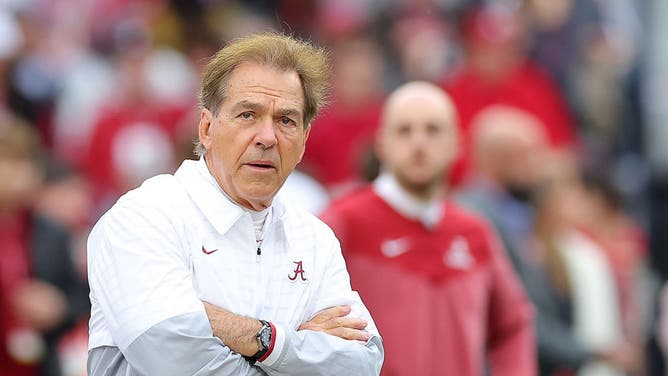Nick Saban’s Hypocritical NIL Comments Ignore His Own Actions
Nick Saban has been in the news this week thanks to comments he's made about the advent of name, image and likeness in college football.
To hear Saban tell it, NIL is destroying the sport, to the point where he felt it was necessary to retire rather than continue coaching.
"Well, all the things I believed in for all these years - 50 years of coaching - no longer exist in college athletics. So, it was always about developing players. It was always about helping people be more successful in life," Saban said.
He also believes that fans will eventually stop watching, as they grow frustrated with players looking for whichever program offers the most money
"We have collectives that in some places are raising huge amounts of money and going to compete against places that do not have the same resources to raise those kinds of funds to pay players," he said in Congress on Tuesday. "You have a pay-for-play system and a free agency system that has no guidelines, so there's no competitive balance. I think there's going to be a lot of places that will say that, and we'll create a caste system where the rich will get richer and the poor will get poorer and eventually fans will look at it and say, 'I don't really want to watch this game.'"
He may have a point about richer schools and poorer schools. And he's clearly right about players being part of a new, system where money is freely available. But he's also being strikingly hypocritical and ignoring how jobs actually work.

TUSCALOOSA, Ala. - Head coach Nick Saban of the Alabama Crimson Tide looks on during pregame warmups prior to facing the Auburn Tigers at Bryant-Denny Stadium on November 26, 2022. (Photo by Kevin C. Cox/Getty Images)
Is Nick Saban Willing To Work For Free?
College football is a gigantic business, generating billions of dollars in revenue across the sport.
In February, ESPN agreed to a six-year deal to broadcast the College Football Playoff. For $7.8 billion. $1.3 billion per year to broadcast 11 games. That doesn't include the rights to other bowl games, the regular season, ticket sales, merchandise, parking, sponsorships, in stadium advertising, branding deals, or even intangible value created by an increase in school prestige and applications from football program success.
Effectively, until recently, virtually the only people not being compensated for their time and efforts to create that revenue were the players on the field. Saban may claim his job was to develop people, but there's no reason young men can't be developed while also being paid.
Does he, for example, think that he didn't develop as a coach during his failed tenure with the Miami Dolphins, for which he was well compensated?
Part of his concern with the sport is that players are often most interested in one question when determining their next school: what will they get paid? Except that's the question everyone asks when considering a new job. If someone searching for jobs gets two offers at reasonably similar companies in acceptable locations and one is $100,000 per year higher than the year, they're going to take the higher-paying job.
And college football, make no mistake, is a job.
Saban himself was making well over $11 million per year to coach at Alabama. As an extremely wealthy man who also owns a chain of car dealerships, he could have easily told the school he intended to forgo his salary since it's so unimportant to his true goal of developing people. Bizarrely, he never did.
Why Should Players Not Be Allowed To Make Their Own Choices?
Yes, it's harder for coaches to navigate the college football landscape these days. Players are able to demand playing time or transfer. They can take better financial offers elsewhere. Their recruitment is more about money than other factors.
Welcome to the job market.
The real issue is that for decades, college football was a system in which coaches made millions of dollars per year, administrators made millions of dollars per year, and players got nothing. Or, at most, whatever under the table money they could.
Development is great, especially for the extremely small percentage of athletes with an NFL future, but for the vast majority who never play at the higher level, their career ends with a smack on the back from their coach and a "good luck out there buddy."
Now those players, who give their health, time, energy and commitment to the job of playing football, receive some compensation. So what if it makes Nick Saban's job harder…that's what he's getting $11.5 million per year to deal with.
Saban could have offered to coach for free, or for a significantly diminished salary. Like his players had to play for free, or like those he believes should consider more than getting the most money. He didn't. Don't blame young kids, often from low income households, for not doing something you wouldn't do yourself.